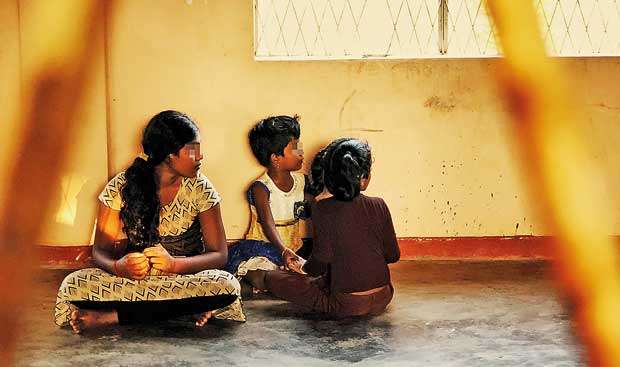Reply To:
Name - Reply Comment
Last Updated : 2024-04-18 19:11:00
Abandoned children of migrant workers and the FBR’s role in mending fractured families

 A cold, sharp-edged knife pressed against her neck, 19 year old Chandrika* was told if she ever disclosed what happened between her and the attacker, she would certainly be killed. Chandrika, the daughter of a migrant worker from Rideegama, terrorised, repeatedly raped and abused by a neighbour while completely neglected by her father, held her secret for as long as she could. Her only solace was confiding in her aunt, living in Nuwara Eliya who, in fear of a repetition, had promptly taken away Chandrika’s younger sister of 12, to live with her. Years after the attack, Chandrika still struggles to come to terms with her past.
A cold, sharp-edged knife pressed against her neck, 19 year old Chandrika* was told if she ever disclosed what happened between her and the attacker, she would certainly be killed. Chandrika, the daughter of a migrant worker from Rideegama, terrorised, repeatedly raped and abused by a neighbour while completely neglected by her father, held her secret for as long as she could. Her only solace was confiding in her aunt, living in Nuwara Eliya who, in fear of a repetition, had promptly taken away Chandrika’s younger sister of 12, to live with her. Years after the attack, Chandrika still struggles to come to terms with her past.
Chandrika is no longer a child, but her agony is just one example out of thousands of families grappling with a life after maternal migration in Sri Lanka. Vulnerabilities of fractured families are only worsened when children are neglected, abandoned and in this case, left with a guardian unable to offer the love and protection of a family. Often, these families are have little to no financial support towards the care of children, resulting in complex family relationships.
The Sri Lanka Bureau of Foreign Employment (SLBFE) discloses the total number of departures for Foreign Employment in 2017 as 212, 162, out of which 56,057 left the island to be employed as housemaids. 7,227 of them are from Kurunegala, the district with the highest number of departures. Meanwhile a report compiled by the International Labour Organisation (ILO) in 2017, on Sri Lankan female migrant workers, highlights that constituting over 75 per cent of the island’s migrant worker numbers at its peak, the trajectory of women’s migration for work has seen a sharp decline over the past five years. The total number of women migrating for work has declined from 49 per cent in 2012 to 34 per cent in 2016. Unfortunately this decline is directly associated with the SLBFE’s introduction of a regulation in 2013, banning prospective women domestic workers with children under the age of five years, from migrating for work overseas, i.e the Family Background Report (FBR). The study also reveals that despite strict adherence to the FBR, women have managed to leave behind children under the age of five years and migrate, including those whose FBR had not been approved. Sub-agents or recruitment intermediaries play a central role in facilitating this process, offering both men and women ‘secure’ and guaranteed avenues of leaving the country.
National Project Coordinator of the ILO Office for Sri Lanka, Swairee Rupasinghe notes that while there are positive impacts of parent migration, complex family situations must be assessed before making further deliberations. “In situations where the mother has migrated for a specific purpose like children’s education, or building a house, women in general are known to send more remittances, more frequently,” Rupasinghe notes. Many case studies and situations have shown fathers engaged in a commendable job of raising children, managing home affairs and finances where the negative impacts of absentee mothers is minimal, she adds.
“However, there are indeed many situations where the guardian of the children is unable to meet educational and emotional demands of the children, especially where the other parent works on a full-time basis or works outside of the home district. In such situations children are neglected, do not receive the love and care a parent would provide and are not supervised or guided as required. This is not only when mothers have migrated, but fathers too,” Rupasinghe comments.
Asked if the FBR is an effective measure to provide a secure, safe and nurturing environment for children Rupasinghe points to the many loopholes in the system of obtaining this clearance certificate, especially since the regulation only applies to women. “There are many vulnerable children in families where the father has migrated and the mother remains at home or is employed elsewhere in the country. It has contributed to irregular migration of women, causing the risks and vulnerabilities of children to increase. The FBR also consumes a disproportionate amount of time for Foreign Employment Development Officers who have other responsibilities in supporting women and men at all stages of the migration cycle. Therefore the FBR in its present form is not an effective tool to contribute towards a secure, safe and nurturing environment for children,” she observes.
Fundamentally, by regulating women, and not men, the policy places the responsibility of childcare and family squarely on the woman’s shoulders, while completely disregarding the role of the father, and the consequences the absence of the father has, on the well-being of children. A 2017 study for the United Nations Country Team in Sri Lanka on Migrant Domestic Workers points out that the care of children was usually taken over by the mother, or parents of the migrant woman, a commonplace practice in many parts of the country.
60-year-old Bandara Menike from Rasnayakapura, whose daughter migrated in search of employment overseas, is one such grandparent, who was appointed as the guardian for two out of three grandchildren, while the other child-the son-lives with the father. Her story is one that amplifies the failures of the guardian to provide a nurturing environment for children, in the absence of parents.
Temperamental Bandara Menike* once slapped her 13-year-old granddaughter Lathika* for speaking to a neighbour she did not approve of. Lathika had refused to attend school following this incident, whereas Bandara Menika had made no effort to send her to school either. Upon returning home that evening, she found that her granddaughter was not at home. Neighbours soon informed Bandara Menike that Lathika had sought refuge at a family friend Asoka’s home, three miles away from her village. Due to a personal difference with Asoka, Bandara Menike refused to bring her granddaughter back home to safety. Little did she care that Asoka was a married man, who had coerced Lathika to live with him. “My daughter will be furious with me, when she returns home” Bandara Menike confided in the Police officers with whom she lodged a complaint only two days later. Lathika was eventually brought home by the Police officers, only after a case was filed in the Kurunegala High Court for statutory rape. While these events unfolded Lathika’s younger brother, Malith* was fending for himself, attending school and coping with life without a responsible guardian.
15-year-old Radha* from Awulegama meanwhile suffered repeated physical abuse from her father, after her mother migrated. She was also repeatedly rescued by the enabling aunts until one day she was raped. The father attempted suicide, but survived. Radha having none to confide in, sought protection of Police officers for not just her, but also her baby sister.
While migrant workers sacrifice a life at home with young children, to pay for their food and education, the circumstances these families deal with are complex, unfortunate and sometimes even cataclysmic. A working paper on the effects of Mother Migration on Children commissioned by Save the Children in 2013 reveals that children left behind by their migrant mothers are more likely to suffer physical or sexual abuse, including incest. They are more likely to act as caregivers to family members in lieu of going to school and are at risk at assuming the conjugal role previously occupied by their mother.
Maternal Migration is not a trend that would end in the near future due to prospects for economic security. However judicial and child protection officers view maternal migration as the leading threat to the well-being of children. Women meanwhile continue to migrate using other channels and circumvent the FBR procedure altogether, thus raising fears of trafficking and unsafe working and living conditions overseas.
Meanwhile Foreign Employment Minister Harin Fernando this week announced plans to replace the FBR regulation, following a report compiled by a Cabinet-appointed committee, which recommended relaxing restrictions imposed by the FBR. The Minster said the committee will be looking to replace the FBR with a family background plan scheme, which would encourage seeking foreign employment through legal channels. However, there was no mention of the new scheme focusing on shared responsibility in the family set up or the involvement of any authority related to child welfare. When the heart of the FBR policy is the safety and well being of the child, has Sri Lanka evaluated the needs of these children?
*Some names and details have been changed to protect identities

Add comment
Comments will be edited (grammar, spelling and slang) and authorized at the discretion of Daily Mirror online. The website also has the right not to publish selected comments.
Reply To:
Name - Reply Comment
On March 26, a couple arriving from Thailand was arrested with 88 live animal
According to villagers from Naula-Moragolla out of 105 families 80 can afford
Is the situation in Sri Lanka so grim that locals harbour hope that they coul
A recent post on social media revealed that three purple-faced langurs near t

10 Apr 2024
09 Apr 2024